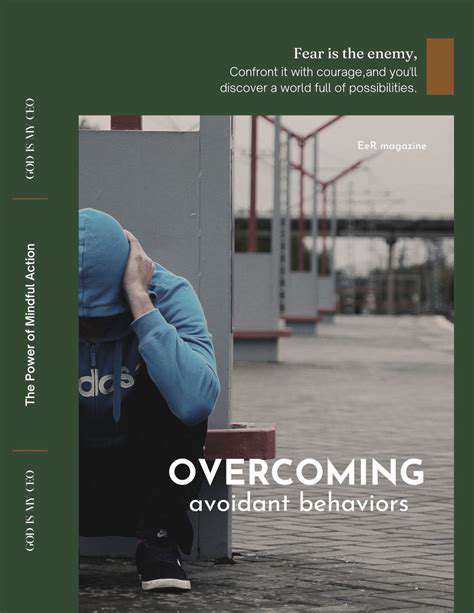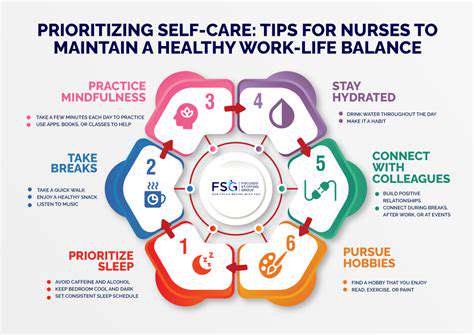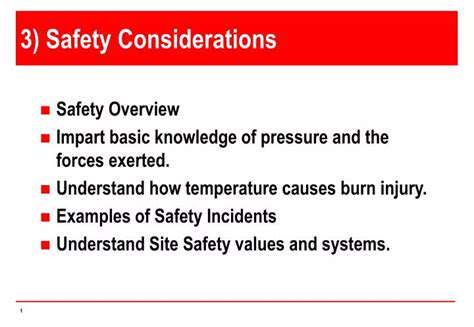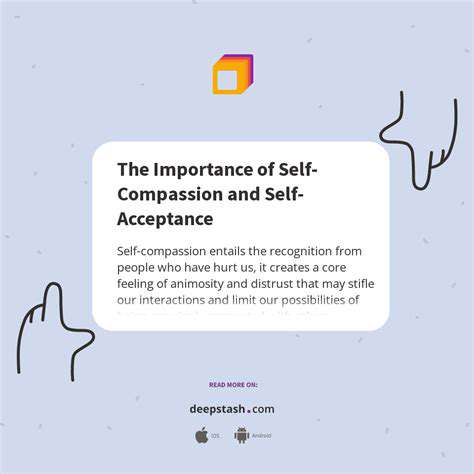How to Build a Sustainable Healthy Lifestyle
Rest and recovery are often overlooked but are crucial components of a sustainable healthy lifestyle. Allowing your body adequate time to rest and recover after physical activity is essential for muscle repair and growth. Prioritizing sleep, incorporating relaxation techniques, and listening to your body's signals are vital for maintaining your energy levels and preventing injuries. This includes understanding the importance of rest days to allow your muscles to rebuild and prevent burnout.
Proper rest and recovery are just as important as the exercise itself. They allow your body to adapt and grow stronger, making your efforts sustainable in the long run.
The Importance of Mental Well-being
Integrating physical activity into your lifestyle is not solely about physical health; it also significantly impacts your mental well-being. Exercise releases endorphins, which have mood-boosting effects, reducing stress and anxiety. Regular physical activity can also improve your sleep quality, leading to increased cognitive function and overall mental clarity. Connecting with your mind through mindfulness or meditation techniques during or after exercise can enhance the holistic benefits.
Prioritizing your mental and emotional health is key to a sustainable and fulfilling lifestyle. This holistic approach to health acknowledges the interconnectedness of mind, body, and spirit.
4C curls are known for their tight, intricate coils, often described as a zesty, almost springy texture. Understanding the unique characteristics of your 4C curls is crucial for successful definition and maintenance. This involves recognizing the different curl patterns you might see, from tightly packed spirals to more defined, individual coils. Different curl patterns might require slightly adjusted techniques for optimal styling, so careful observation is key.
Cultivating Mental Well-being Through Mindfulness and Self-Care

Cultivating Mindfulness
Developing mindfulness involves paying attention to the present moment without judgment. This practice, often incorporated into meditation, allows us to observe our thoughts and feelings as they arise, rather than getting swept away by them. Mindfulness can significantly reduce stress and anxiety by fostering a sense of detachment from negative emotions. Practicing mindfulness can be as simple as focusing on your breath or noticing the sensations in your body while going about your daily activities.
Regular mindfulness practice can lead to a greater understanding of our inner world, which can be incredibly helpful in managing challenging emotions. By observing our thoughts and feelings without judgment, we can begin to develop a more compassionate and accepting relationship with ourselves.
Prioritizing Self-Care
Self-care isn't just about pampering; it's a crucial aspect of mental well-being. It encompasses a range of activities that nourish your physical, emotional, and mental health. This includes getting enough sleep, eating nutritious foods, and engaging in regular physical activity. These seemingly simple actions can have a powerful impact on your overall sense of well-being and resilience.
Beyond the basics, self-care also involves engaging in activities that bring you joy and relaxation. This could be anything from reading a book to spending time in nature, listening to music, or pursuing a hobby. Making time for activities you genuinely enjoy is essential for recharging your batteries and maintaining a positive outlook.
Building Strong Relationships
Humans are social creatures, and strong social connections are vital for mental well-being. Cultivating meaningful relationships with family, friends, and community members provides support, understanding, and a sense of belonging. Nurturing these relationships involves actively listening, communicating effectively, and offering genuine support during challenging times.
Seeking Professional Support
Don't hesitate to seek professional help if you're struggling with your mental well-being. Mental health professionals, such as therapists and counselors, can provide guidance, support, and strategies for managing various challenges. They can offer a safe and confidential space for you to explore your emotions and develop coping mechanisms. Therapy can be extremely beneficial in navigating difficult life situations, improving self-awareness, and building resilience.
Talking to a mental health professional is a sign of strength, not weakness. It demonstrates a proactive approach to your well-being and can lead to significant improvements in your overall quality of life. Seeking help is a courageous step towards achieving better mental health and a more fulfilling life.
Establishing Healthy Boundaries
Setting healthy boundaries is essential for protecting your mental well-being. This involves recognizing your limits and needs and communicating them clearly to others. It's about saying no to commitments that drain you emotionally or physically, and prioritizing your own needs. This doesn't mean being selfish; it's about recognizing that your well-being is just as important as the well-being of others.
Learning to establish and maintain healthy boundaries can significantly reduce stress and prevent burnout. It allows you to focus on what truly matters and empowers you to make choices that support your overall mental health.
Building a Supportive Network and Maintaining Long-Term Motivation

Cultivating Connections
Building a supportive network is crucial for navigating the complexities of life. Strong relationships provide emotional support, practical assistance, and a sense of belonging. This network can be composed of family, friends, mentors, or even colleagues. It's about surrounding yourself with people who uplift you, encourage your growth, and celebrate your successes.
Investing time and effort in nurturing these connections is essential. Regular communication, active listening, and showing genuine interest in others are key elements in fostering meaningful relationships. These connections can be a lifeline during challenging times and a source of inspiration in moments of doubt.
Identifying Your Support System
Understanding the different types of support you need is the first step in building a robust network. Do you require emotional support to process difficult feelings? Or perhaps you need practical assistance with tasks or responsibilities? Identifying these needs allows you to seek out individuals who can provide the specific support you require.
Consider who in your life embodies these qualities and actively seek out their support when needed. Reflect on past experiences and identify individuals who have consistently offered help and encouragement. Expanding your support system involves proactively reaching out to potential allies, even if it feels a little uncomfortable at first.
Nurturing Existing Relationships
Maintaining existing relationships is just as important as building new ones. Regular communication, whether it's a phone call, text message, or coffee date, helps to keep connections strong and relevant to your life. Actively listening to others and showing empathy are essential ingredients for sustaining healthy relationships. This means truly hearing what they have to say, not just waiting for your turn to speak.
Scheduling dedicated time for meaningful interactions strengthens bonds. Whether it's a weekly lunch with a friend, a monthly catch-up with a family member, or an annual retreat with a mentor, these planned interactions demonstrate your commitment to the relationship. These acts of nurturing show that you value the people in your life and their contributions to your well-being.
Seeking New Connections
Expanding your network often involves reaching out to new people. Joining clubs, groups, or volunteering opportunities can provide avenues to connect with like-minded individuals. Networking events and workshops are also excellent platforms for meeting new people with shared interests. Don't be afraid to initiate conversations and show genuine interest in getting to know others.
Attending conferences or workshops in your field of interest can be beneficial in expanding your professional network. Actively participating in discussions and engaging with speakers creates opportunities to meet individuals who can provide valuable insights and support for your professional goals. This can open doors to new opportunities and collaborations.
Managing Expectations and Boundaries
It's crucial to manage expectations regarding the support you receive from your network. Not everyone can provide every type of support, and that's perfectly okay. Understanding that boundaries exist and respecting others' time and energy is essential for maintaining healthy relationships. Recognize that you can't rely on others to fulfill all your needs. Developing a realistic understanding of the support you can expect ensures that you're not disappointed or frustrated when you don't receive exactly what you want.
Setting personal boundaries is just as important as understanding those of others. Communicate your limits and needs clearly. This helps others understand how to support you in a way that feels genuine and appropriate. Learning to say no when necessary is a vital skill for maintaining healthy relationships and preventing burnout.





![Best Snacks for Diabetics [Approved List]](/static/images/26/2025-05/HealthyFatsandComplexCarbohydrates.jpg)




![Guide to Quitting Smoking for Good [Strategies & Support]](/static/images/26/2025-07/RewardingYourselfandCelebratingMilestones.jpg)
